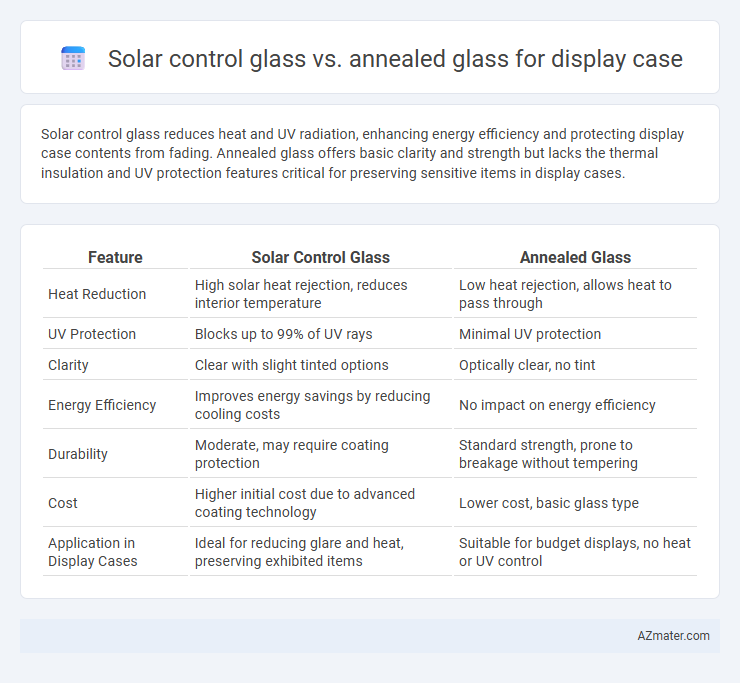Solar control glass reduces heat and UV radiation, enhancing energy efficiency and protecting display case contents from fading. Annealed glass offers basic clarity and strength but lacks the thermal insulation and UV protection features critical for preserving sensitive items in display cases.
Table of Comparison
| Feature | Solar Control Glass | Annealed Glass |
|---|---|---|
| Heat Reduction | High solar heat rejection, reduces interior temperature | Low heat rejection, allows heat to pass through |
| UV Protection | Blocks up to 99% of UV rays | Minimal UV protection |
| Clarity | Clear with slight tinted options | Optically clear, no tint |
| Energy Efficiency | Improves energy savings by reducing cooling costs | No impact on energy efficiency |
| Durability | Moderate, may require coating protection | Standard strength, prone to breakage without tempering |
| Cost | Higher initial cost due to advanced coating technology | Lower cost, basic glass type |
| Application in Display Cases | Ideal for reducing glare and heat, preserving exhibited items | Suitable for budget displays, no heat or UV control |
Introduction to Display Case Glass Types
Solar control glass in display cases reduces heat and UV radiation, protecting sensitive items while enhancing energy efficiency with its reflective coatings. Annealed glass offers basic clarity and strength but lacks the advanced thermal insulation and UV filtering properties of solar control glass. Choosing between these types depends on the need for temperature regulation and protection against sunlight damage in display environments.
What is Solar Control Glass?
Solar control glass is specially coated or treated to reduce heat gain by reflecting and absorbing solar radiation, making it ideal for display cases in environments with high sunlight exposure. Unlike annealed glass, which is a standard, untreated glass known for its basic safety and clarity, solar control glass enhances energy efficiency and helps maintain consistent internal temperatures. This glass type improves visibility of displayed items by minimizing glare while protecting against UV damage.
Understanding Annealed Glass
Annealed glass is a basic, non-tempered glass commonly used in display cases due to its clarity and cost-effectiveness, but it lacks the strength and thermal resistance of solar control glass. Solar control glass incorporates coatings that reduce solar heat gain and UV radiation, making it ideal for protecting sensitive items in display cases from heat damage and fading. Understanding annealed glass's limitations in impact resistance and heat insulation is crucial when choosing the best glass for display applications requiring durability and energy efficiency.
Comparing Thermal Properties
Solar control glass for display cases significantly reduces heat transmission by reflecting and absorbing solar radiation, maintaining cooler interior temperatures and protecting sensitive items from thermal damage. Annealed glass, lacking specialized coatings, allows more heat to pass through, resulting in higher interior temperatures and increased risk of overheating. The superior thermal insulation of solar control glass enhances energy efficiency and display preservation compared to annealed glass.
Light Transmission and Clarity Differences
Solar control glass for display cases reduces light transmission by filtering harmful UV rays and controlling heat, resulting in lower visible light transmission compared to annealed glass. Annealed glass offers higher clarity and maximum light transmission, allowing true color representation and enhanced visibility for displayed items. The reduced glare and improved energy efficiency of solar control glass can protect sensitive exhibits while maintaining a balance between visibility and environmental control.
UV Protection Capabilities
Solar control glass provides superior UV protection for display cases by blocking up to 99% of harmful ultraviolet rays, significantly reducing the risk of fading and damage to sensitive items. Annealed glass offers minimal UV protection, making it less effective in preserving the integrity and appearance of displayed artifacts or merchandise. For optimal preservation and enhanced longevity of display contents, solar control glass is the preferred choice due to its advanced ultraviolet filtering properties.
Energy Efficiency for Display Cases
Solar control glass significantly enhances energy efficiency in display cases by reducing heat transfer and minimizing solar heat gain, which lowers cooling costs. Annealed glass lacks specialized coatings, resulting in higher thermal conductivity and increased energy consumption for temperature regulation. Choosing solar control glass improves temperature stability, prolongs product freshness, and reduces HVAC load in retail environments.
Safety and Durability Considerations
Solar control glass offers enhanced safety and durability for display cases due to its tempered nature, which resists impact and minimizes the risk of shattering into sharp pieces. Annealed glass, while cost-effective, lacks the strength and fracture resistance of solar control glass, posing higher safety risks especially in high-traffic areas. The UV protection and heat reduction in solar control glass also help preserve displayed items by minimizing thermal stress and fading, extending both the longevity of the display case and its contents.
Cost Analysis: Solar Control vs Annealed Glass
Solar control glass typically has a higher initial cost compared to annealed glass due to its advanced coating technology that reduces heat transmission and UV exposure in display cases. While annealed glass is more affordable upfront, solar control glass can lead to long-term energy savings by minimizing cooling expenses in climate-controlled environments. Cost analysis should weigh the premium price of solar control glass against the potential reduction in energy consumption and extended preservation of displayed items.
Choosing the Right Glass for Your Display Case
Selecting the right glass for your display case hinges on balancing durability, clarity, and heat management. Solar control glass reduces heat buildup and UV damage by reflecting solar radiation, making it ideal for preserving sensitive merchandise in bright environments. Annealed glass offers basic transparency and cost-effectiveness but lacks the protective properties against heat and UV rays that solar control glass provides.

Infographic: Solar control glass vs Annealed glass for Display case
 azmater.com
azmater.com